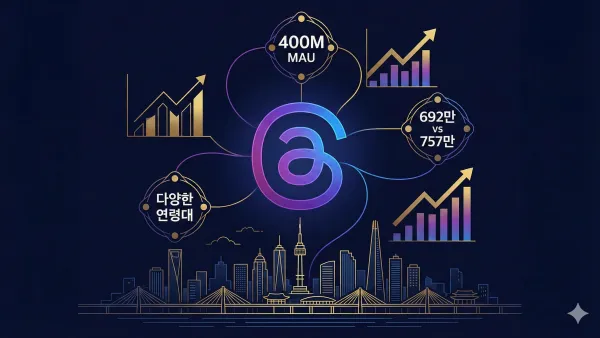SK Telecom Q2 2025: AI Grows 13.9% Amid Cyber Crisis
SK Telecom reported a 37.1% operating income decline in Q2 2025 due to cybersecurity incident costs, while its AI business grew 13.9%. The company launched a $9.2 billion customer compensation program and plans to operate the Ulsan AI data center by 2027.

SK Telecom's Q2 2025 earnings report, released on August 6, 2025, encapsulates the challenges and opportunities facing South Korea's telecommunications industry. While one-time costs from a cybersecurity incident slashed operating income by 37.1%, the AI business grew 13.9% year-over-year, demonstrating its potential as a future growth engine. This earnings announcement represents more than just numbers—it's an inflection point where crisis management intersects with future strategy.
2025 Q2 SK Telecom Key Performance Metrics and Year-over-Year Changes
SK Telecom's Q2 2025 consolidated revenue reached KRW 4.34 trillion ($3.34 billion), down 1.9% from the same period last year. More notably, operating income plummeted 37.1% to KRW 338.3 billion ($260 million), while net income crashed 76.2% to KRW 83.2 billion ($64 million). This dramatic profitability decline reflects one-time costs from the recent cybersecurity incident, including customer SIM card replacements and compensation to retail partners.
On a non-consolidated basis, the company reported revenue of KRW 3.14 trillion ($2.41 billion), operating income of KRW 250.9 billion ($193 million), and net income of KRW 36.9 billion ($28 million). Quarter-over-quarter comparisons show revenue down 1.0%, operating income down 48.0%, and net income down 92.2%, confirming the cyber incident's impact spread across the entire Q2 performance.
Cybersecurity Incident Response: Detailed Analysis of the $9.2 Billion 'Accountability and Commitment' Program
SK Telecom's 'Accountability and Commitment' program represents a KRW 1.2 trillion ($9.2 billion) initiative—the largest customer compensation and security investment plan in Korean telecommunications history. The program operates on three main pillars.
The first pillar, the Customer Assurance Package, includes immediate security enhancements. SK Telecom has completed enrollment of all domestic and international customers in SIM protection services and is providing free SIM card replacements. The company has elevated its Fraud Detection System (FDS) to maximum security levels and implemented a cyber breach compensation guarantee system to address potential damages from SIM cloning. Additionally, all customers will receive Zimperium, a mobile security solution, free for one year.
The second pillar involves a KRW 700 billion ($538 million) information security investment over five years. This aims to build a Zero Trust-based security infrastructure, applying the philosophy of "never trust, always verify." The system will comply with Korea Internet & Security Agency (KISA) 2.0 guidelines while meeting global security standards.
The third pillar, the Customer Appreciation Package, provides KRW 500 billion ($385 million) in direct customer benefits. This includes a 50% discount on phone bills for August 2025 and an additional 50GB of data monthly through year-end. T Membership partner discounts will expand, and the company offers a remarkable policy: customers who cancelled service can have their previous membership status and tenure fully restored if they return within six months.
AI Data Center and AIX Business Double-Digit Growth: Background and Outlook
Despite overall weak performance, the AI business showed exceptional growth. The AI Data Center (AI DC) business achieved revenue of KRW 108.7 billion ($84 million), up 13.3% year-over-year, driven by improved utilization rates. The AI Transformation (AIX) business recorded KRW 46.8 billion ($36 million) in revenue, growing 15.3% through expanded B2B solution sales.
This growth stems from SK Telecom's differentiated AI strategy. The company pursues a dual-track approach, simultaneously developing data center hardware infrastructure and AI software services—similar to strategies employed by global tech giants like Amazon or Google. This contrasts with competitor KT's focus on its 'KT AI One' B2B platform and LG Uplus's emphasis on connecting U+5G AI services with smart home integration.
The AI agent service 'A.' (A-dot) has also shown impressive results. As of late July 2025, it surpassed 10 million subscribers, representing about 20% of South Korea's population. Recently launched beta services 'A. Note' and 'Briefing' attracted 800,000 users within one month, indicating strong market reception.
Ulsan AI Data Center 2027 Launch Target: Analyzing the $7.7 Billion Annual Revenue Goal
The Ulsan AI Data Center project, announced in June 2025, represents the cornerstone of SK Telecom's long-term growth strategy. Built in collaboration with Amazon Web Services (AWS) and SK Group affiliates, this facility targets operations by 2027 and will serve as the central hub of the 'AI Infrastructure Super Highway' vision.
Once both the Ulsan AI DC and Seoul's Guro DC are operational, SK Telecom will secure over 300MW of total data center capacity. The company has set an ambitious target of KRW 1 trillion ($770 million) in annual AI DC revenue by 2030. Current quarterly AI DC revenue of KRW 108.7 billion annualizes to approximately KRW 435 billion ($335 million), meaning the 2030 target requires about 2.3x growth from current levels.
Several factors support this growth target's feasibility. First, the global AI market continues its rapid expansion. Second, the AWS partnership provides favorable conditions for attracting global customers. Third, growing domestic AI demand and government AI industry support policies create positive momentum. However, similar investment plans from competitors and potential market entry by global big tech companies remain variables.
Real Impact of 50% Bill Discount and 50GB Additional Data for Consumers
SK Telecom's customer compensation program delivers immediate and tangible benefits to consumers. The August 50% bill discount saves 5G Standard plan users KRW 27,500 ($21), 5G Premium users KRW 37,500 ($29), and 5G Premium Plus users KRW 47,500 ($37). For a family of four, this translates to savings exceeding KRW 100,000 ($77) in August alone.
The value of 50GB additional monthly data through year-end is also substantial. Considering market prices for 50GB data options average around KRW 10,000 ($8), this represents approximately KRW 50,000 ($38) in value over five months. This data allowance enables 10-12 hours of 4K video streaming, 25-30 hours of 1080p video, or over 1,000 songs via music streaming. For AI service users, it means worry-free voice recognition and real-time translation usage.
The one-year free provision of Zimperium security solution, typically worth KRW 10,000-20,000 ($8-15) monthly, offers value beyond monetary benefits. Given rising mobile security threats, this provides substantial security enhancement beyond simple financial savings.
Comparing Korean Telecom Big Three AI Strategies: SK Telecom's Differentiation Points
Korea's three major telecom companies pursue distinct AI strategies. SK Telecom adopts an integrated approach, running parallel AI data center and AIX businesses. The company aims to build an ecosystem spanning from infrastructure to services, while achieving B2C market success with its A. service.
KT focuses on B2B markets centered on its 'KT AI One' platform. The company concentrates on providing AI solutions for enterprise customers, particularly developing differentiated services for manufacturing and financial sectors. LG Uplus pursues a strategy linking U+5G AI services with smart homes, focusing on AI applications in daily life.
SK Telecom's differentiation lies in scalability through global partnerships. The AWS collaboration goes beyond simple infrastructure development, potentially serving as a springboard for global market entry. Additionally, possessing both hardware and software enables integrated solution provision, creating competitive advantages.
Short-term Outlook Through 2027 and Long-term Growth Scenarios to 2030
Over the next 1-2 years, SK Telecom will likely face continued cost pressures from information security investments. While the KRW 700 billion security investment will burden short-term profitability, it's deemed essential for customer trust recovery. Strengthening security systems is a prerequisite for preventing customer churn and attracting new subscribers.
AI business revenue contribution is expected to increase gradually. While AI currently represents about 3.6% of total revenue, it's expected to enter a full growth trajectory with the 2027 Ulsan data center launch. The rapid growth of generative AI markets and accelerating corporate digital transformation will positively impact both AI DC and AIX businesses.
Looking at the long-term scenario through 2030, SK Telecom aims to transform from a traditional telecom company into an AI technology company. If AI DC achieves its KRW 1 trillion annual revenue target and AIX grows to similar scale, total AI business revenue could exceed KRW 2 trillion. This would mean AI business accounting for over 10% of total company revenue.
However, several challenges remain for realizing this growth scenario. First, the KRW 700 billion security investment must translate into substantial security improvements. Second, AI business profitability needs continuous improvement. Third, the company must provide differentiated value amid competition with global big tech companies.
Key Risk Factors for Investors and Consumers to Watch
This earnings report highlights three key risks for investors. First is the possibility of recurring cybersecurity incidents. Despite the KRW 700 billion security investment, perfect security is impossible, and additional incidents could cause greater trust loss and cost burdens.
Second is uncertainty around AI business profitability. While showing double-digit growth, it remains unclear when profitability will improve relative to massive infrastructure investments. Growth could slow if global economic recession or AI investment bubble concerns materialize.
Third is market share decline risk from intensifying competition. KT and LG Uplus are making similar AI investments, while global big tech companies are accelerating Korean market entry. Without differentiated competitive advantages, achieving returns on investment may prove difficult.
From a consumer perspective, service quality and personal data protection are core concerns. Whether massive security investments translate to actual service stability improvements and whether personal information is adequately protected during AI service expansion remain important observation points.
Finding Balance Between Crisis Response and Future Investment
SK Telecom's Q2 2025 earnings compressively illustrate the reality facing Korea's telecommunications industry. The company faces the dual challenge of responding to the immediate cybersecurity crisis while continuing investment in AI as a future growth engine.
The KRW 1.2 trillion 'Accountability and Commitment' program expresses determination to recover customer trust even at the expense of short-term profitability. Simultaneously, the AI business's 13.9% growth and Ulsan data center project demonstrate future growth potential.
For investors, SK Telecom represents a complex investment opportunity where short-term volatility coexists with long-term growth potential. For consumers, it offers immediate benefits alongside expectations for safer and more innovative services. Whether SK Telecom can transform crisis into opportunity and achieve its goals of the 2027 Ulsan data center launch and KRW 1 trillion AI DC revenue by 2030 remains to be seen.
This analysis is based on SK Telecom's official press release dated August 6, 2025. Future outlooks and targets presented are company plans, and actual results may vary depending on market conditions and business environment.




